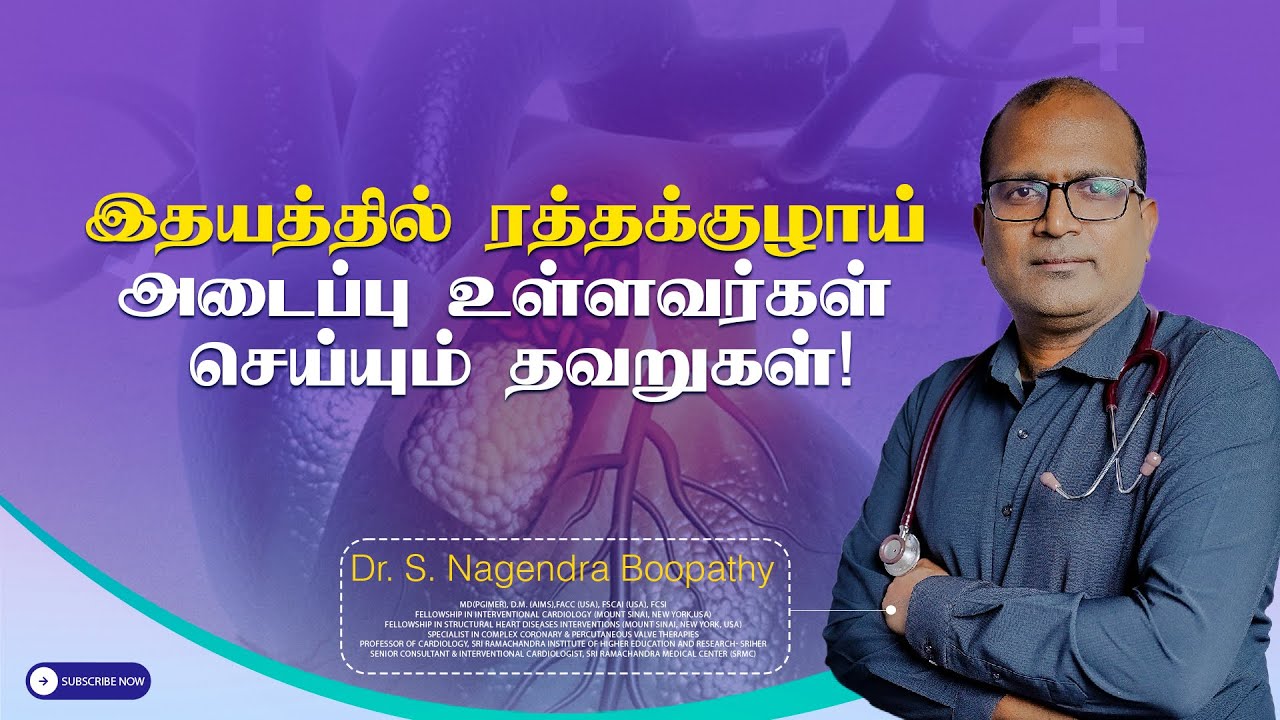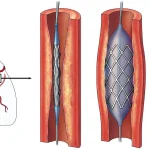Heart blockage is a serious medical condition that requires careful management, timely intervention, and strict adherence to medical advice. Dr. Nagendra Boopathy, a well-known cardiologist practicing at Dr. Boopathy’s Heart Care in Chennai, shares invaluable insights into the common mistakes made by patients suffering from heart blockage. Understanding these pitfalls can help patients improve their heart health, reduce the risk of heart attacks, and enhance their quality of life.
In this comprehensive article, we explore the key points highlighted by Dr. Boopathy, including medication adherence, lifestyle changes, smoking cessation, diet control, and the importance of regular medical checkups. Whether you are a heart patient or a caregiver, this guide will help you avoid critical errors and take proactive steps toward a healthier heart.
Understanding Heart Blockage and Its Risks
Heart blockage occurs when the blood vessels supplying the heart muscle become narrowed or blocked due to plaque buildup or blood clots. This can lead to reduced blood flow, causing chest pain, breathlessness, or in severe cases, a heart attack. Patients diagnosed with heart blockage often undergo treatments such as bypass surgery or angioplasty with stent placement. However, treatment does not end there—it is crucial to manage the condition continuously through medication and lifestyle adjustments.
Dr. Boopathy emphasizes that patients must never discontinue their prescribed medications, especially blood thinners, without consulting their cardiologist. Blood thinners like aspirin, clopidogrel, ticagrelor, and prasugrel are essential to prevent clot formation inside the stents or arteries, which can trigger a heart attack.
The Most Common Mistakes Made by Patients with Heart Blockage
1. Skipping or Stopping Medications Without Medical Advice
One of the gravest mistakes heart patients make is stopping their medications on their own. Many patients feel better after initial treatment and assume they no longer need their pills. This is dangerous, especially with blood thinners, because the risk of clot formation remains high.
Dr. Boopathy explains that blood thinners have specific durations of action, for example, ticagrelor works for about 30 hours. If a patient stops taking the medication abruptly, the heart is vulnerable to clotting, increasing the chance of a heart attack significantly. In fact, data shows that patients who discontinue their medication prematurely have a substantially higher risk of recurrent heart attacks, sometimes with fatal outcomes.
Patients are advised to always discuss any medication changes with their cardiologist and never stop drugs unless specifically instructed. If there are side effects like bleeding or unusual symptoms, contact your doctor or healthcare provider immediately before making any decisions.
2. Continuing Smoking After a Heart Attack
Smoking is like adding fuel to a fire when it comes to heart disease. Dr. Boopathy repeatedly stresses that continuing to smoke after a heart attack or diagnosis of heart blockage is one of the biggest mistakes patients can make. Smoking not only harms the smoker but also affects others through passive smoking.
Smoking increases the risk of blood clots, damages blood vessels, and contributes to the progression of heart disease. Studies cited by Dr. Boopathy reveal that among patients who continue smoking after a heart attack, the likelihood of a second heart attack rises dramatically. On the other hand, those who quit smoking for at least two to three years significantly reduce their risk of further heart problems.
Quitting smoking is challenging, but it is the single most effective lifestyle change a heart patient can make. Support from family, healthcare providers, and smoking cessation programs can make a significant difference.
3. Poor Dietary Control and Consuming Unhealthy Foods
Diet plays a pivotal role in managing heart disease. Patients often make the mistake of returning to unhealthy eating habits once they feel better. Dr. Boopathy highlights the importance of avoiding foods high in salt, fried items, processed foods, and red meats, all of which can worsen heart conditions.
Maintaining a heart-healthy diet rich in fruits, vegetables, whole grains, lean proteins, and healthy fats helps in controlling blood pressure, cholesterol levels, and blood sugar—all critical factors in heart disease management.
4. Not Knowing or Monitoring Their Health Numbers
Many patients are unaware of their vital health numbers such as blood pressure, blood sugar, cholesterol levels, and body mass index (BMI). Dr. Boopathy points out that knowing these numbers and keeping them within target ranges is essential to prevent complications.
For example, maintaining LDL cholesterol below 50 mg/dL or at least below 70 mg/dL for high-risk individuals can reduce the chances of heart attack recurrence. Similarly, controlling blood pressure and blood sugar to recommended targets based on age and risk factors is necessary for optimal heart health.
Regular monitoring, either at home or during medical visits, and following the doctor’s advice on medication and lifestyle adjustments are crucial steps for every heart patient.
5. Not Getting Annual Flu Vaccination
Influenza (flu) can trigger inflammatory responses in the body, increasing the risk of heart attacks in patients with heart disease. Dr. Boopathy stresses the importance of receiving an annual flu vaccine to reduce this risk.
Every year, flu strains change, and vaccination helps protect against the latest strains. Heart patients who avoid flu vaccination are more susceptible to complications, including recurrent heart attacks during the flu season. In light of recent experiences with COVID-19, the role of vaccinations in preventing heart-related complications has become even more evident.
6. Avoiding Physical Activity and Cardiac Rehabilitation
After a heart attack or treatment for heart blockage, many patients tend to become sedentary, fearing that physical activity might worsen their condition. However, Dr. Boopathy encourages patients to engage in cardiac rehabilitation programs and gradually increase physical activity levels.
Starting with light exercises and progressively increasing to 7,000 to 8,000 steps per day or resistance exercises two to three times per week can greatly improve heart health, reduce the risk of further events, and enhance overall well-being.
Physical activity combined with proper diet, medication adherence, and lifestyle changes forms the cornerstone of secondary prevention in heart disease.
Additional Important Advice for Heart Patients
Dr. Boopathy also touches on other critical aspects of heart care:
- Regular Follow-ups: Patients should attend scheduled appointments for medication review and health monitoring. Missing follow-ups can lead to uncontrolled risk factors and increase the chance of complications.
- Communication with Healthcare Providers: If medication side effects or health issues arise, patients should promptly communicate with their cardiologist or healthcare team rather than making changes independently.
- Understanding Risk Factors: Every patient’s risk profile is unique, and treatment targets may vary. Knowing your specific targets for blood pressure, cholesterol, and blood sugar is essential.
Summary: Top 6 Common Mistakes by Heart Blockage Patients
- Discontinuing prescribed medications, especially blood thinners, without medical advice.
- Continuing to smoke after a heart attack or diagnosis of heart blockage.
- Poor diet control, including consumption of fried, processed, and salty foods.
- Not knowing or monitoring key health numbers like blood pressure, cholesterol, and blood sugar.
- Skipping annual flu vaccination.
- Avoiding physical activity and cardiac rehabilitation.
Frequently Asked Questions (FAQs)
Q1: Why is it important not to stop blood thinners after a stent placement?
Blood thinners prevent clots from forming inside the stent or arteries. Stopping them abruptly can lead to clot formation, causing a heart attack. Always consult your cardiologist before making any changes to your medication.
Q2: How does smoking affect heart health after a heart attack?
Smoking damages blood vessels, increases clotting risk, and accelerates heart disease progression. Continuing to smoke after a heart attack significantly raises the chance of a second heart attack.
Q3: What dietary changes should heart blockage patients make?
Patients should avoid fried foods, processed items, excessive salt, and red meats. A heart-healthy diet includes plenty of fruits, vegetables, whole grains, lean proteins, and healthy fats.
Q4: How often should heart patients get a flu vaccination?
Heart patients should receive an annual flu vaccine every year to protect against changing flu strains and reduce the risk of heart complications during the flu season.
Q5: What type of physical activity is recommended after a heart attack?
Patients should start with light exercises and gradually increase activity levels, aiming for 7,000 to 8,000 steps daily and resistance exercises two to three times per week, under medical supervision or through cardiac rehabilitation programs.
Conclusion
Managing heart blockage effectively requires more than just medical procedures; it demands a holistic approach combining medication adherence, lifestyle changes, smoking cessation, diet control, regular health monitoring, vaccination, and physical activity. Dr. Nagendra Boopathy’s expert advice highlights the critical mistakes patients often make and guides them on how to avoid these pitfalls.
By understanding and implementing these recommendations, patients can significantly reduce their risk of recurrent heart attacks and lead healthier, longer lives. Remember, your heart health is in your hands—stay informed, stay vigilant, and work closely with your healthcare team for the best outcomes.
For more expert advice on heart health and patient care, stay connected and keep prioritizing your heart’s well-being.
Dr. S Nagendra Boopathy
Schedule an Appointment:
- Link: Schedule Here
- Instructions: Select the date and time below to schedule an appointment.
For Appointment Confirmation and Follow-Ups, Please Contact:
- 9 AM – 4 PM: +919360438720
- 6 PM – 8 PM: +918754498680
Ensure all details are verified after scheduling your appointment.




